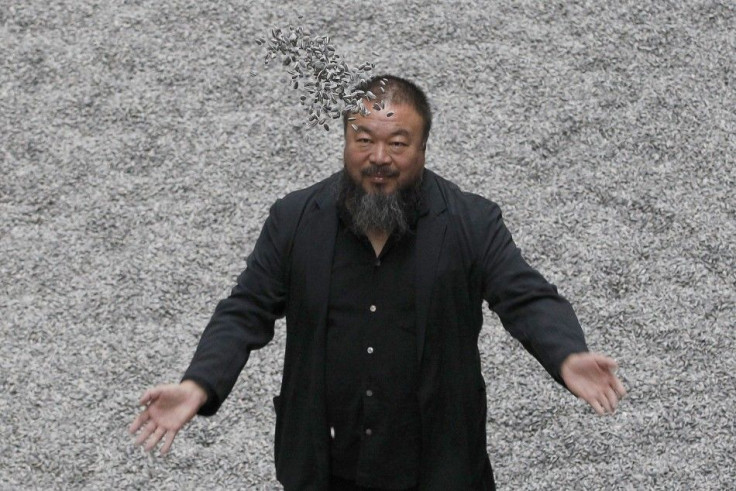Chinese Dissident Ai Weiwei's Sunflower Seeds Pull In $782,000

An auction of Chinese dissident artist Ai Weiwei's porcelain sunflower seeds at Sotheby's in New York on Wednesday has fetched $782,000, near the higher end of the $600,000 to $800,000 estimate experts originally expected the piece to generate.
The seeds were made by Chinese workers who toiled for years. Ai has made a small fortune from them.
The sunflower seeds auctioned Wednesday weighed a full ton, but are from an original set of 100 million individual porcelain seeds, altogether weighing 150 tons. Each was painstakingly painted by hand by female artisans in the ancient Chinese city of Jingdezhen, renowned for more than 1,500 years of ceramic making. The final porcelain sunflower seed looks from the outside to be remarkably similar to the real thing.
An initial auction in early 2011 at Sotheby's in London for just 100 kilograms (220 pounds) of the seeds generated $559,394. That means just a small portion (less than a hundredth) of the total produced has already been sold for over $1.3 million. It is unknown whether Ai plans to eventually sell remaining portions of the seeds or what he will do with the money generated.
1,600 workers were employed by Ai Weiwei for 5 years to paint the seeds, which ultimately went on display in the Tate Museum of Modern Art in London in late 2010. The seeds were laid out in in Turbine Hall at the gallery, looking from a distance to be similar in outward appearances to a gravel bed. The Tate exhibition was praised for its innovative approach as well as its subtle political commentary. Ai told reporters in the past that Chairman Mao used to be adored in China as the sun, and the people were often depicted as sunflowers.
Although Jingdezhen had a glorious past supplying porcelain for China's ancient emperors, recently it has fallen on economic hard times. Many of the traditional artisan methods used in the town are disappearing. Working conditions are also suspect since mining and processing ceramic materials often produces porcelain dust, harmful for the lungs. Indeed, fears that particulate matter would endanger visitors to the Tate led to the exhibit being shut down to visitors only 4 days after its original opening in 2010.
Ai has said in the past that workers at Jingdezhen were given a living wage, and that the sunflower seed project provided a new source of income and a make-work project using traditional techniques for local communities. Many had also brought the seeds home to work on as well. Whether the success of the recent auctions means Ai is interested in returning to Jingdezhen or whether workers there will see more economic benefits is unknown.
But the entire process for producing the final art product seems oddly similar to what happens in China's other factory towns, where laborers work for long periods with comparatively little return. A documentary from Tate showed a young girl proudly saying that she had made 2,000-3,000 yuan for her efforts, or not more than 500 U.S. dollars. One wonders what others like her would think about the final appraised value of her work at Sotheby's, and whether the Jingdezhen workers will see more significant portions of the proceeds.
In the meantime, the artist will have his own financial troubles to be worried about. In summer 2011, the Beijing Tax Bureau charged his company Beijing FAKE Cultural Development Ltd. with tax evasion, ordering a payment of 12 million yuan (US $1.9 million). Western media reported that he was arrested at Beijing airport in early 2011 and later held for almost three months by Chinese authorities. Ai eventually paid a $1.3 million bail to leave prison. Supporters of Ai in China and abroad say the charge was a fabrication to tarnish his name in public, largely in response to his stance on Chinese human rights. Ai is appealing the charge and is fighting the case in court.
© Copyright IBTimes 2024. All rights reserved.





















